Related Research Articles
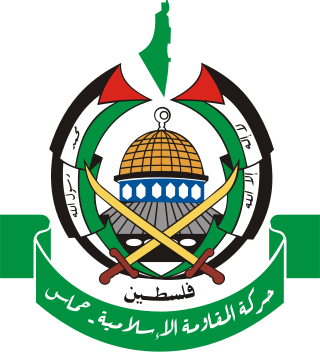
The Islamic Resistance Movement, abbreviated Hamas, is a Palestinian nationalist Sunni Islamist political organisation with a military wing called the Izz al-Din al-Qassam Brigades. It has governed the Israeli-occupied Gaza Strip since 2007.

Yasser Arafat, also popularly known by his kunya Abu Ammar, was a Palestinian political leader. He was chairman of the Palestine Liberation Organization (PLO) from 1969 to 2004, President of the State of Palestine from 1989 to 2004 and President of the Palestinian Authority (PNA) from 1994 to 2004. Ideologically an Arab nationalist and a socialist, Arafat was a founding member of the Fatah political party, which he led from 1959 until 2004.
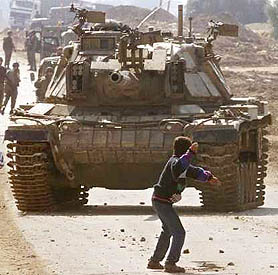
The Second Intifada, also known as the Al-Aqsa Intifada, was a major uprising by Palestinians against Israel and its occupation. The period of heightened violence in the Palestinian territories and Israel continued until the Sharm el-Sheikh Summit of 2005, which ended hostilities.
Sheikh Ahmed Ismail Hassan Yassin was a Palestinian politician and imam who founded Hamas in 1987. He also served as the first chairman of the Hamas Shura Council and de facto leader of Hamas since its inception from December 1987 until his assassination in March 2004.

Hassan Nasrallah was a Lebanese cleric and politician who served as the third secretary-general of Hezbollah, a Shia Islamist political party and militia, from 1992 until his assassination in 2024.

Black September, also known as the Jordanian Civil War, was an armed conflict between Jordan, led by King Hussein, and the Palestine Liberation Organization (PLO), led by chairman Yasser Arafat. The main phase of the fighting took place between 16 and 27 September 1970, though certain aspects of the conflict continued until 17 July 1971.

Mousa Mohammed Abu Marzook is a Palestinian politician and senior member of Hamas who served as the first chairman of Hamas Political Bureau from 1992 until 1996 and deputy chairman of Hamas Political Bureau from January 1997 until April 2013, where he was succeeded by Ismail Haniyeh.

Palestinian political violence refers to actions carried out by Palestinians with the intent to achieve political objectives that can involve the use of force, some of which are considered acts of terrorism, and often carried out in the context of the Israeli–Palestinian conflict. Common objectives of political violence by Palestinian groups include self-determination in and sovereignty over all of Palestine, or the recognition of a Palestinian state inside the 1967 borders. This includes the objective of ending the Israeli occupation. More limited goals include the release of Palestinian prisoners held by Israel and recognition of the Palestinian right of return.

Abdel Bari Atwan is an Egyptian-born British journalist and the editor-in-chief of Rai al-Youm, an Arab world digital news and opinion website. Previously he was the editor-in-chief of the London-based pan-Arab newspaper Al-Quds Al-Arabi from the founding of the paper in 1989 until July 2013.

Abdul Rahman ibn Abdul Aziz al-Sudais, better known as al-Sudais, is the Chief Imam of the Grand Mosque, Masjid al-Haram in Makkah, Saudi Arabia; the President of the Affairs of the Two Holy Mosques; a renowned Qāriʾ ; he was the Dubai International Holy Qur'an Award's "Islamic Personality Of the Year" in 2005. Al-Sudais has preached Islam's opposition to "explosions and terrorism", and has called for peaceful inter-faith dialogue, but also been criticized for vilifying non-Muslims and especially Jews in his sermons. He has denounced the treatment of Palestinians by Israeli settlers and the state of Israel, and called for more aid to be sent to Palestinians. He has also been noted for identifying women's un-Islamic behavior as in part responsible for the winter 2006 drought in Saudi Arabia. In 2016, he delivered the very important Hajj sermon to a multitude of pilgrims gathered at Arafat after prayers.
The Arab Peace Initiative, also known as the Saudi Initiative, is a 10 sentence proposal for an end to the Arab–Israeli conflict that was endorsed by the Arab League in 2002 at the Beirut Summit and re-endorsed at the 2007 and at the 2017 Arab League summits. The initiative offers normalisation of relations by the Arab world with Israel, in return for a full withdrawal by Israel from the occupied territories, with the possibility of comparable and mutual agreed minor swaps of the land between Israel and Palestine, a "just settlement" of the Palestinian refugee problem based on UN Resolution 194, and the establishment of a Palestinian state with East Jerusalem as its capital. A Palestinian attack called the Passover massacre took place on 27 March 2002, the day before the Initiative was published, which initially overshadowed it.
The history of Hamas is an account of the Palestinian nationalist and Islamist – described by some as fundamentalist – socio-political organization with an associated paramilitary force, the Ezzedeen al-Qassam Brigades. Hamas (حماس) Ḥamās is an acronym of حركة المقاومة الاسلامية Ḥarakat al-Muqāwamat al-Islāmiyyah, meaning "Islamic Resistance Movement".
Muslim supporters of Israel refers to both Muslims and cultural Muslims who support the right to self-determination of the Jewish people and the likewise existence of a Jewish homeland in the Southern Levant, traditionally known as the Land of Israel and corresponding to the modern polity known as the State of Israel. Muslim supporters of the Israeli state are widely considered to be a rare phenomenon in light of the ongoing Israeli–Palestinian conflict and the larger Arab–Israeli conflict. Within the Muslim world, the legitimacy of the State of Israel has been challenged since its inception, and support for Israel's right to exist is a minority orientation. Pro-Israel Muslims have faced opposition from both moderate Muslims and Islamists.
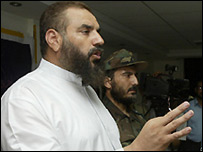
Nizar Rayan was a high-ranking Hamas leader who served as a liaison between the Palestinian organization's political leadership and its military wing. Also a professor of Islamic law, he became a top Islamic cleric within Hamas after the death of Sheikh Ahmed Yassin in 2004. Rayan was a strong promoter between 1994 and 2004 of suicide bombings on Israel, and his son killed himself on one such mission. Rayan and most of his family were killed in an Israeli airstrike during the Gaza War.
Events in the year 1994 in Israel.
The Palestine Papers is a collection of confidential documents about the Israeli–Palestinian peace process leaked to Al Jazeera, which published them between 23 and 26 January 2011. Nearly 1,700 documents from the office of the main PLO negotiator, Saeb Erekat, and his team have been published, dating from 1999 to 2010.
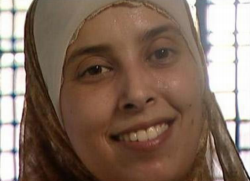
Ahlam Aref Ahmad al-Tamimi is a Jordanian national known for assisting in carrying out the Sbarro restaurant suicide bombing in Jerusalem, in 2001. She was convicted by an Israeli military tribunal and received multiple life sentences, but was released in 2011 as part of the Gilad Shalit prisoner exchange and exiled to Jordan. She hosts a television show about Palestinians in Israeli prisons.
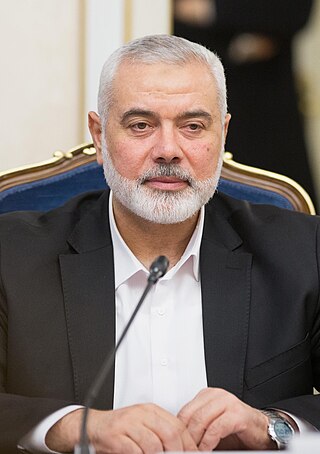
Ismail Haniyeh was a Palestinian politician who served as chairman of the Hamas Political Bureau from May 2017 until his assassination in July 2024. He also served as prime minister of the Palestinian National Authority from March 2006 until June 2014 and Hamas leader in the Gaza Strip from June 2007 until February 2017, where he was succeeded by Yahya Sinwar.

Khaled Mashal is a Palestinian politician who served as chairman of the Hamas Political Bureau from 1996 until May 2017, when he was succeeded by Ismail Haniyeh. He has also covered duties as the acting leader of Hamas twice, from July 2024 until August 2024 and from October 2024 to the present day, after both leaders were assassinated by Israel. He was regarded as one of the most prominent leaders of Hamas since the death of Ahmed Yassin, alongside Ismail Haniyeh and Yahya Sinwar.
Al Jazeera Arabic is a Qatari state-owned Arabic-language news television network. It is based in Doha and operated by the Al Jazeera Media Network, which also operates Al Jazeera English. It is the largest news network in the Middle East and North Africa region. It was founded in 1996 by the then Emir of Qatar Sheikh Hamad bin Khalifa Al Thani.
References
- 1 2 "An Interview With Al-Jazeera Editor-in-Chief Ahmed Sheikh". World Politics Review. December 7, 2006.
- ↑ Victor Davis Hanson (December 15, 2006). "Israel did it!". National Review .